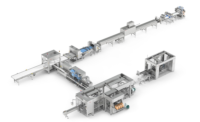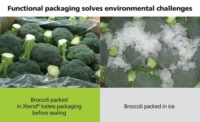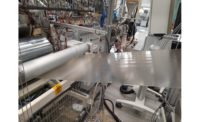Brand Packaging
Kashi's Bear Naked Granola Moves to Flexible Packaging

Packaging Strategies spoke with Jeff Wooster, global sustainability director for Dow Packaging and Specialty Plastics, on the transition to a pouch for Kellogg's sub-brand Kashi and its Bear Naked Granola line in this Q&A.
PS: How Did Kashi come to find Dow as a partner for its Bear Naked line?
JW: Our packaging division has had a strategic partnership with Kashi's parent company, Kellogg dating back to 2017. We had been discussing available packaging technologies, and Kellogg encouraged Kashi's team to consult our packaging experts.
Together we developed a unique partnership that involved working beyond the typical supplier-customer relationship to accelerate packaging innovation. The breakthrough came in March 2017, when the Kashi team that worked on the Bear Naked brand went to Dow’s Pack Studios near Houston to meet with our global network of packaging experts, equipment and testing capabilities. Over the course of two days, the team refined the project's goals. Six months later Kashi ran a full-scale trial and was able to make and seal its newly developed packaging — passing integrity testing and sensory analysis, which assessed if the food and pouches met the performance of its current pouches.
PS: What was the issue with TerraCycle? (was it consumers complaining about having to ship to recycle, not enough recycling being done with their products, etc.?)
JW: Kellogg had been using a service for its Bear Naked granola packaging that required consumers to sign up for a special program and ship flexible pouches to a location for recycling. The company wanted to create a simple, convenient process for consumers to bring used pouches to retail stores, using the How2Recycle program’s store drop-off label and existing store collection infrastructure.
However, before that could happen, Kellogg needed a recyclable film structure for its Bear Naked packaging that would be acceptable at these drop-off locations.
PS: What exactly is Dow’s RecycleReady film solution?
JW: RecycleReady Technology from Dow offers packaging manufacturers and brands such as Kellogg the most innovative options available. By using Dow’s portfolio of resins, adhesives, and compatibilizers, packaging manufacturers can produce more sustainable, recyclable packaging – a way to create flexible packaging that can be easily recycled through existing polyethylene (PE) film recycle streams, such as grocery store drop-off programs in the United States and Canada. And, importantly, these packages qualify for the How2Recycle logo which lets consumers know they can drop off the packaging at retail stores.
Packages made with RecycleReady technology experience comparable functional performance in stiffness and barrier protection (when compared to current stand up pouches (SUP) in the market), complete hermetic seals to avoid leaks, the same end-use convenience and recyclability in communities with existing programs for PE film recycling (e.g., in-store drop-off in North America) .
PS: How it was adapted for this usage?
JW: Dow engineers adapted their RecycleReady and RETAIN™ polymer modifier technologies to meet Bear Naked’s packaging needs.
This non-laminated standup pouch design provided recycling solutions that traditional lamination could not. When paired with a Dow high performance sealant, the whole structure was able to accommodate high packaging machine speeds and hermetic sealing. Most importantly, the polymer modifiers compatibilized the package’s EVOH barrier layer with polyethylene to create a film that’s suitable for existing recycling streams, such as the store drop-off program in the U.S.
PS: What did Berry Global and Entour offer for the packaging?
JW: Berry Global’s nine-layer Entour™ film structure, a high-density PE material, was lightweight and flexible, providing important features beyond recyclability. The film structure surpassed Kellogg’s barrier requirements for shelf life. It also featured a clear window to showcase the product inside, was stiff enough to stand up on store shelves, and could be hermetically sealed.
PS: This is fully recyclable, and approved by the Sustainable Packaging Coalition for How2Recycle drop offs. Has it yet become more acceptable for consumers to recycle this way?
JW: Yes, in fact the Sustainable Packaging Coalition (SPC) promoted this new option for packaging manufacturers and brands in the form of in-store drop-off centers for polyethylene films.
In North America, when brand owners and retailers request Dow’s RecycleReady Technology from their converters, their final package structure can be submitted to the Sustainable Packaging Coalition to qualify for the How2Recycle label. The label instructs consumers to visit how2recycle.info to learn how to use alternative recycling streams to curbside for previously unrecyclable stand-up pouches.
We have already heard from feedback received on the How2Recycle label that more consumers are eager to adopt this seamless process and are confident that as use of the label grows even more will do so in the future
PS: Can you explain the process?
JW: The process took about 18 months. There were many materials and components used to manufacture the flexible pouch, and each element needed to meet certain requirements for the entire package to be easily recycled by consumers using in the in-store alternative to curbside. And, most importantly, the pouch design needed to be validated to confirm its effectiveness for maintaining the quality of the product inside the pouch.
Over the year and a half of collaboration, challenges included modifying the film to improve efficiencies on high-speed HFFS packaging machines. The team also worked to optimize line conditions to function effectively with the film, zipper and ink systems to create the standup pouch. The new recyclable package had enhanced barrier properties compared to the previous package, resulting in better retention of freshness and flavors.
PS: Is this partnership moving forward with other Kashi lines?
JW: Bear Naked introduced the new flexible packaging to its broader line of fully recyclable granola products in August 2019 making its packaging portfolio in the U.S. truly designed for recyclability. The goal is to bring this packaging to other Kashi lines, as well as additional products where it is well suited for use.
Looking for a reprint of this article?
From high-res PDFs to custom plaques, order your copy today!







